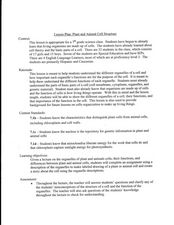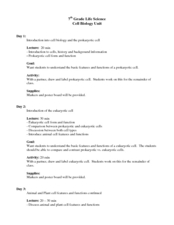Curated OER
The Biological Carbon Cycle
Young scholars learn about the biological carbon cycle. In this carbon cycle lesson, students access the web site and mouse over the diagrams to follow the carbon cycle. They read about what happens to humans and plants during this cycle.
Curated OER
Plant and Animal Cell Structure
Seventh graders identify the different parts and functions of the cell. In this biology lesson, 7th graders make a labelled diagram of either a plant or animal cell. They write a story about it.
Curated OER
Plant Reproduction
Students identify the different parts and function of a flower's reproductive system. For this biology lesson, students explain how pollination works. They watch a video and practice labeling parts of both flower and leaf.
Curated OER
Native Plant Restoration Project
Students distinguish between exotic and native plant species. They work in groups in the field to restore a natural habitat. A class map is created to reflect their work in the field.
Curated OER
Plant Biotechnology: Controlling Tissue Differentiation
Students demonstrate hormonal control of plant tissue differentiation and relate this differentiation to gene expression. They explore the effects of hormones (auxin and cytokinin) on the genes that control tissue differentiation in callus.
Curated OER
I'm Lichen Bio Plant Word Search Puzzle
In this biology worksheet, students look for the words that are part of the word search puzzle that is focused around the theme of the sheet.
Curated OER
7.012 Genetics Section Problems
A set of phenotypes is listed for mice, flowers, blood type, and plants. For each, biology buffs analyze the percentages of phenotypes in the offspring and then identify the genotypes of the parents. This is a different approach to...
Curated OER
Diploid Genetics and Chromosomal Inheritance
Given the phenotypes of offspring in mice, flowers, and human blood type, genetics pupils practice determining the genotypes of the parents. Four short answer questions follow. The entire assignment will require learners to put on their...
Nuffield Foundation
Observing Water Moving Through Plants
We know plants assist in the water cycle, but how do plants get water from the ground into the air? Through a series of demonstrations or labs, scholars observe the movement of water through plants. They microscopically view the cells...
Curated OER
Transport in Plants
Quite a detailed and advanced look at the transport mechanisms of a plant. The absorption and control of sugar and water concentration are explained and will help an understanding of homeostasis concepts and organ specialization.
AAAS
Identification and Classification of Grassland Plants
Take learning outside and start classifying grasslands. Young ecologists observe grassland plants in order to classify them into the appropriate species by family. They note their characteristics and where they grow. A true field...
Curated OER
Support and Transport in Plants
All types of transport systems in a dicotyledon plant are detailed here, with clear labelled diagrams and notes for the specific structures and functions. The way that these systems have adapted, and how support is assisted by the...
Curated OER
The Marvels of Mud
Young scientists roll up their sleeves and get a little dirty in this three-day earth science investigation. Following the scientific method, children monitor the growth of algae in pond water samples in order to determine the role that...
Curated OER
Tropism
Students conduct various experiments on tropism. In this biology lesson, students explain how gravity affects the growth of plant roots. They identify the different types of tropisms.
Curated OER
Wiggley Worms
Students investigate how worms affect plant growth. In this biology lesson, students construct a worm ecosystem in a plastic 2 liter bottle and plant a seed in the soil. They later compare the ecosystems with worms to ones without...
Curated OER
The Great Archeological Dig
Learners explore biology by identifying a diagram. For this cell anatomy lesson, students read a story about archeology and conduct a fictitious archeology dig in class in which they search for animal cells. Learners define a list of...
Curated OER
Pair the Plants: An Introduction to Scientific Names
Students examine why plants have both common and scientific names, then complete the activity by matching each common plant name with its scientific name. They finish by working in cooperative groups to create an ABC of Plants class book.
Curated OER
Breaking It Down
Seventh graders explain the mechanism of digestion. In this biology activity, 7th graders perform an iodine test to check for the presence of starch. They discuss how energy travels through the food chain.
Curated OER
Cell (Biology)
Students conduct a series of activities to explore the nature of cells. In this biology instructional activity, students observe plant and animal cells under the microscope and compare them. They differentiate osmosis and diffusion.
Curated OER
Introduction to Ocean Grazers
Learners explore biology by creating a poster with classmates. In this oceanography lesson, students identify the importance of coral reefs to the ocean's ecology and examine a food web of ocean animals. Learners define a list of...
Curated OER
Seeds of Wetland Life
Students participate in several activities on seed exploration. In this biology lesson, students classify seeds according to their dispersal method. They explain the different adaptations plant have to disperse their seeds.
Curated OER
Terrestrial Sequestration - Photosynthesis and Cellular Respiration
Students investigate how plants absorb carbon dioxide during photosynthesis. In this biology lesson, students differentiate photosynthesis and cellular respiration. They discuss the important role of plants in the environment.
Curated OER
The Magic School Bus Gets Eaten
Students learn along with Ms. Frizzle's class. In this Magic School Bus lesson plan, students eat while they act as links in the food chain. Popcorn bags stand for food energy that is passed along the links in a food chain from the sun,...
Curated OER
Chloroplasts and Mitochondria
For this biology learning exercise, students read about the mechanism of photosynthesis to answer 43 short answer questions. They explain the role of chloroplasts in the process.
Other popular searches
- Plant Biology Photosynthesis
- Grade 11 Plant Biology
- Plant Biology Projects
- Plant Biology Leave
- Plant Biology Flowers
- Plant Biology Vocabulary
- Plant Biology Unit Plans
- Plant Biology Healthy Plants
- Plant Biology Powerpoint's
- Plant Biology Seeds
- Plant Biology Powerpoints
- Plant Biology Regeneration

























